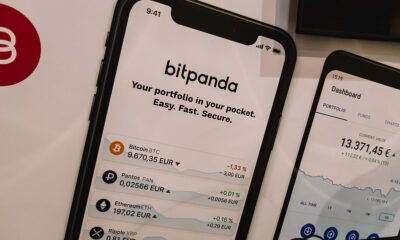Fintech
Unitplus Unveils ‘AktienPlus’: Revolutionizing Investment with Active ETFs
Fintech Unitplus, known for its “CashPlus” offering, now ventures into active ETFs with “AktienPlus,” partnering with JP Morgan. Active ETFs, blending passive indexing with fund manager strategies, show rapid growth. Unitplus expects 20% of its managed €100M assets to adopt AktienPlus by 2025, aiming to expand further into retirement accounts and cross-border pension solutions.

Fabian Mohr has already shown that he has a feel for new trends in the financial market. In August last year, the founder of the Berlin investment start-up Unitplus launched a special interest offer. The company promised its customers almost four percent annually, the special feature being that it was a money market ETF. The funds usually bring higher returns than traditional overnight money, and there are neither fixed terms nor limits on deposits.
With its offering (“CashPlus”), Unitplus was one of the first fintech providers on the market – and it was a hit. “We are growing by millions every week,” said Mohr shortly after the launch, referring to the growth in deposits. So far, customers have invested more than 100 million euros in the investment product. Now Unitplus wants to do pioneering work again.
The investment fintech company is entering the trading of active ETFs. In the future, customers on the platform will be able to invest in exchange-traded index funds that are optimized for additional returns by fund managers in the background. The offer is called “AktienPlus” and the US investment bank JP Morgan is the partner.
“This means that beginners and professionals alike can benefit from an innovation trend that has already gained significant momentum in the USA,” said Unitplus founder Fabian Mohr. He himself analyzed stocks for several years at the billion-dollar fund provider Flossbach von Storch.
Active ETFs are growing rapidly
In fact, active ETFs are a hot topic of conversation in the financial industry. The fund category is based on the promise of combining the advantages of passive index funds (such as the well-known MSCI World) with the know-how of experienced fund managers. Such funds basically use algorithms to replicate the performance of a specific market, which makes them comparatively cheap.
But fund managers deviate from this by deliberately overweighting stocks that they believe have particularly high potential. In this way, they want to achieve returns above the market average. The role model is US investor Cathie Wood, who has generated a lot of buzz with her actively managed Ark Innovation ETF.
The market is still relatively small: Active ETFs account for just 1.9 percent of all assets in exchange-traded funds. But growth rates in the segment are high: Over the past five years, the market has doubled in size, while the volume of passive funds has grown by only 20 percent per year. The gap is therefore steadily narrowing. According to the latest data from the consultancy ETFGI, there could soon be $1 trillion in active ETFs .
Fund managers beat Asia ETF
Unitplus also hopes to benefit from this with its new offering. “We believe it is possible that AktienPlus will make up around 20 percent of the total mix of our managed customer assets by the end of next year,” says founder Fabian Mohr. The fintech manages customer funds of more than 100 million euros (assets under management).
To start with, investors can invest in a portfolio of seven actively managed index funds. These include the so-called “JPM AC Asia Pacific ex-Japan Research Enhanced Index Equity ETF”, which invests in stocks from the Asia-Pacific region (excluding Japan). The fund has achieved a return of almost 26 percent in the last twelve months. By comparison, the passive counterpart (MSCI AC Asia Pacific Ex Japan) has risen by 20 percent in the same period.
Part of the Unitplus offering are also special funds that focus on companies from Europe or the USA. With annual fees of 0.76 percent on the investment assets, the funds at Unitplus are somewhat more expensive than passive funds. According to founder Mohr, however, this also includes other offers from the fintech, such as a bank card or savings plans.
Unitplus plans to gradually expand its range of active ETFs
In the long term, Unitplus should also be possible to receive government subsidies for investing in active ETFs. “Over the next few months, we want to develop AktienPlus so that it is also suitable for the retirement savings account of the former Federal Minister of Finance,” says Mohr. However, the corresponding law was not passed after the recent breakdown of the traffic light coalition. It is unclear whether the offer will still be available in this form.
Mohr is therefore already keeping an eye on another development in the financial market: the Pan European Pension Product (PEPP), also known colloquially as the European pension. It is a cross-border pension portfolio with relatively favorable conditions. Due to a strict cost cap, only a few companies have offered the European pension so far. Reforms are currently being worked on. “So it’s an exciting market in the long term,” said Mohr.
__
(Featured image by viarami via Pixabay)
DISCLAIMER: This article was written by a third party contributor and does not reflect the opinion of Born2Invest, its management, staff or its associates. Please review our disclaimer for more information.
This article may include forward-looking statements. These forward-looking statements generally are identified by the words “believe,” “project,” “estimate,” “become,” “plan,” “will,” and similar expressions. These forward-looking statements involve known and unknown risks as well as uncertainties, including those discussed in the following cautionary statements and elsewhere in this article and on this site. Although the Company may believe that its expectations are based on reasonable assumptions, the actual results that the Company may achieve may differ materially from any forward-looking statements, which reflect the opinions of the management of the Company only as of the date hereof. Additionally, please make sure to read these important disclosures.
First published in Capital. A third-party contributor translated and adapted the article from the original. In case of discrepancy, the original will prevail.
Although we made reasonable efforts to provide accurate translations, some parts may be incorrect. Born2Invest assumes no responsibility for errors, omissions or ambiguities in the translations provided on this website. Any person or entity relying on translated content does so at their own risk. Born2Invest is not responsible for losses caused by such reliance on the accuracy or reliability of translated information. If you wish to report an error or inaccuracy in the translation, we encourage you to contact us

-

 Fintech2 weeks ago
Fintech2 weeks agoFintower Secures €1.5M Seed Funding to Transform Financial Planning
-

 Impact Investing7 hours ago
Impact Investing7 hours agoItaly’s Listed Companies Reach Strong ESG Compliance, Led by Banks and Utilities
-

 Impact Investing1 week ago
Impact Investing1 week agoBNP Paribas Delivers Record 2025 Results and Surpasses Sustainable Finance Targets
-

 Biotech2 weeks ago
Biotech2 weeks agoTwogee Biotech Advances Industrial Enzyme Solutions for Circular Production
















